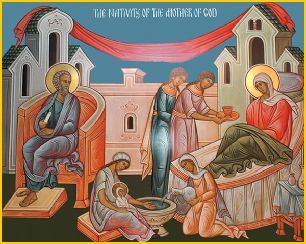|
|||
|---|---|---|---|
| This weekly bulletin insert complements the curriculum published by the Department of Christian Education of the Orthodox Church in America. This and many other Christian Education resources are available at http://dce.oca.org. | |||

For the feast of the Nativity of the Theotokos we read one of Jesus Christ's most meaningful statements about who His true followers are. It comes in a reading for the day, from Luke 11:27-28: "A woman in the crowd raised her voice and said to Him, 'Blessed is the womb that bore You, and the breasts that You sucked!' But He said, 'Blessed rather are those hear the word of God and keep it!'" This passage has been interpreted in diverse ways. Some Biblical interpreters see it as a rebuke to Mary, in which Christ denies any special place to her as His biological mother and says it is only by keeping God's word that a person is blessed. But the Orthodox Church has a different view, as did the early Church. That view is expressed in the ancient phrase, "The Virgin conceived through her ear." This is not a fundamental misunderstanding of how the process of human conception works, though some modern commentators seem to see it that way. It is a reflection of the way the Church understands the passage from Luke's Gospel. Jesus is not rebuffing His mother; rather He is pointing out that she is more than His biological parent—she is the great example of one who heard the word and kept it. She heard God's word for her at the angel Gabriel's visit, celebrated as the Annunciation. She was willing to keep, or carry out, God's word that she was to be the mother of His Son. It's in this way that she "conceived through her ear"—by agreeing to the word she heard, and bearing the Son of God. The day after the feast of the Nativity of the Virgin, the Church remembers her parents Joachim and Anna. Like other Biblical couples before them, Joachim and Anna were aging and childless. As it was for those other couples, childlessness was a great heartache for these two. In fact, it brought them not only sadness but also humiliation. It's traditionally understood that Joachim was turned away when he came to offer prayers because he had no children. Anna's sorrow must have been even deeper because of her husband's experience. 
Joachim and Anna's longing for a child was fulfilled. The Church's placing of their commemoration on the day after the feast of that child's nativity reminds us that Mary's birth was a normal human one. She was not immaculately conceived, and she was not born to eminent people. Yet she would become the Mother of God, the most exalted example of one who receives God's grace after having heard and kept His word. In Orthodox worship we are constantly offered the chance to hear words of Scripture. Beautiful melodies entice our ears to pay attention to the hymns with their rich theology. So our hearing of the word is helped along in many ways. The keeping of the word, though, is entirely up to us. |
|||
